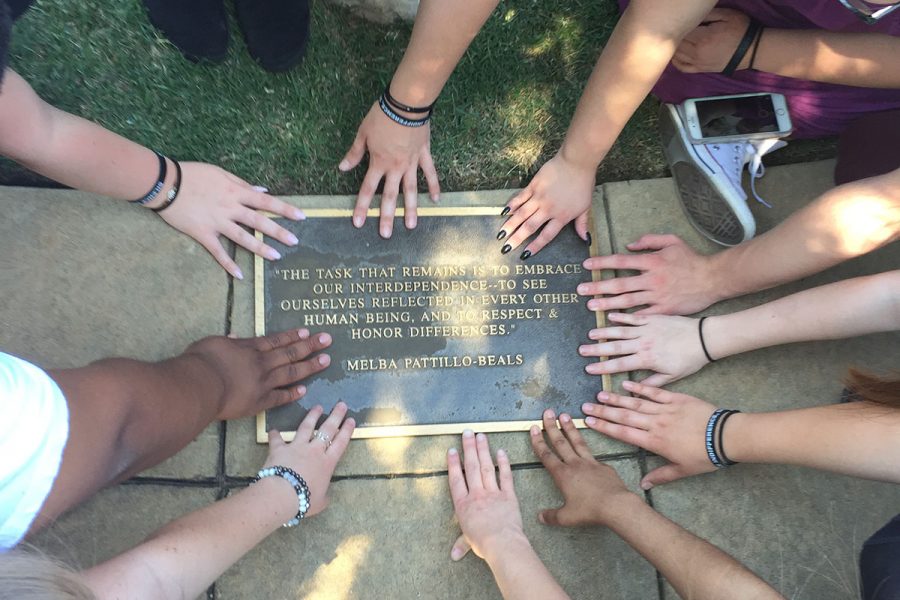Knowledge is power
Teachers spread word about historical studies electives
The students enrolled in the Holocaust and Human Rights class traveled in spring 2017 to the Little Rock Nine Monument to relive the infamous day when 1,200 members of the U.S. Army’s 101st Airborne Division from Fort Campbell, Kentucky,escorted nine African-American students into Central High School in Little Rock, AR, on Sept. 24, 1957. Submitted photo
March 12, 2018
Lay your foot on Little Rock Central High School, where American soldiers escorted nine African-American students into an all-white high school as a test of Brown v. Board of Education in 1957. Meet one of the survivors of the Holocaust, in which six million Jews and millions more “undesirables” were killed.
These are some of the many activities Angela Spence and Michele Rigdon would have hosted in their African-American Studies and the Holocaust and Civil Rights classes this year. However, they are not teaching these important details of history. The classes did not make this year.
“[It] is an injustice to our students since they do not know the contributions [African-Americans] made [for this country],” said Spence, who teaches African-American Studies. “The entire foundation of the United States was built on the backs of [African-Americans], and there is so much knowledge that students do not know.”
Now that students are deciding what courses to take for the 2018-19 school year, Spence is visiting students in history classes to promote the course.
“This class wouldn’t be significant if the textbooks were written like they were supposed to be in the first place,” Spence said. “But since they are not, this class is extremely important because [African-Americans] are a part of that tapestry, that American fabric, that quilt of American history, [which] is missing significant and intricate parts of African-American contributions. We are all a part of that tapestry that made America what it is today. And because of that, I have to teach it. It is something I have to do.”
Spence hopes that students will take the class to learn more about the melting pot that is America and the history of African-Americans.
“[I hope the students will gain lots of] knowledge,” Spence said. “Lots of ‘Wow! I did not know that.’ It’s about them coming in here and learning something they should already know, but they don’t.”
This knowledge will allow students to understand different perspectives other than their own, respect opposing viewpoints and have a broader understanding of American history. With this understanding, Spence hopes that students will come together.
“We are so afraid of the unknown. We do not want to get out of our comfort zone,” Spence said. “It is what we know. And if we reach out to somebody we don’t know, we are afraid to do so because of the unknown. Racism will never be eliminated because it is just human nature. However, I feel that it can shrink if we would just step out of our comfort zone and get to know someone we don’t [know].”
Similarly, the Holocaust and Civil Rights class did not make for the current school year. Rigdon is taking strides to persuade students to enroll in this class.
“The class is an elective class that is offered to juniors and seniors. The first semester we focus on the Holocaust, and so we read a variety of novels, pamphlets, poems and we look at works of art and see how it contributes to lessons that we can learn today about how to be aware of things that happen historically so we can avoid circumstances that may be threatening in our own world,” Rigdon said. “In the second semester, we focus on civil rights and so that semester pairs very well with Mrs. Spence’s African-American Studies class.”
The two teachers hope to co-teach the second semester together and unite the classes with a unique culminating experience.
“We want to take a spring trip to Central High School in Little Rock and then to Memphis to the Civil Rights Museum where Martin Luther King Jr. was assassinated,” Rigdon said. “It would be a great culminating experience outside of the classroom, and the museum is a great historical place.”
Both teachers feel a responsibility to teach these classes due to the vital knowledge each class holds.
“As educators, we believe that we need to expose students to the truth of these historical circumstances and not necessarily the textbook rendition of things that happened,” Rigdon said. “We want to focus on the people that were there and told the story most truthfully. There are many lessons that we can learn from those to move us to a better world. I believe every student who takes the class will come out of it differently because they will have time to delve into the issues that these classes cover.”
Students are encouraged to sign up for these classes if they will be a junior or a senior in the 2018-19 school year. To sign up for these classes, see the academic advisers or Bettie Lynn Stark, associate principal for college and career readiness, in the Academic Advisement Center or Stark’s office, respectively, either before or after school or during lunch. Schedule changes are allowed through June 29.
















